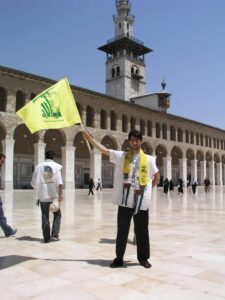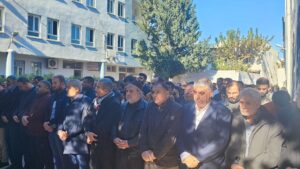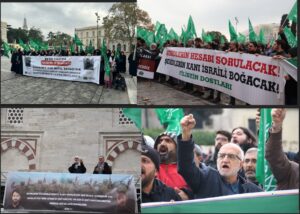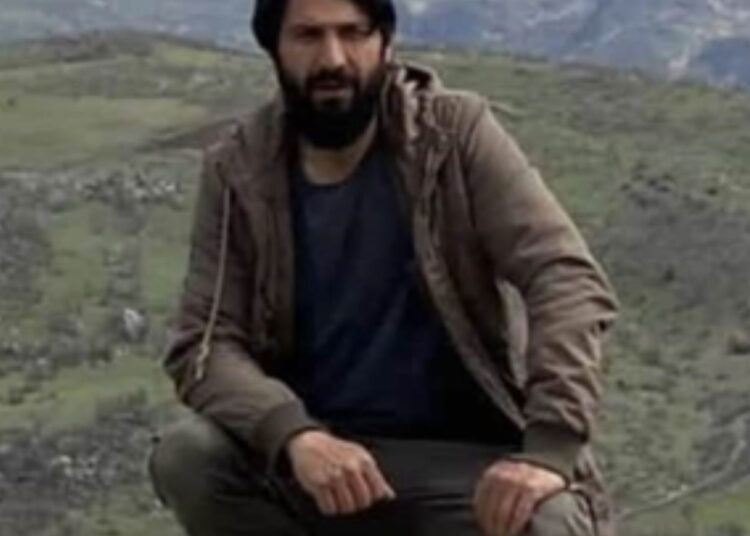Abdullah Bozkurt/Stockholm
Yakup Erdal, a 41-year-old Turkish jihadist killed in Lebanon on November 21 by an Israeli drone strike, was groomed by a high-ranking operative with longstanding ties to Iranian intelligence, according to confidential documents obtained by Nordic Monitor.
Erdal, a resident of the predominantly Kurdish district of Kahta in Turkey’s southeastern Adıyaman province, spent 10 days in Istanbul before traveling to Lebanon, where he joined Hamas’s military wing, the Izz Al-Din Al-Qassam Brigades.
He was accompanied by Seyfullah Bilal Öztürk, another Turkish jihadist who also fell victim to the same attack near the southern city of Tyre, just seven miles from the Israeli border. Both were reportedly operating under Khalil Hamad Kharaz Abu Khaled, commander of the Lebanese branch of al-Qassam Brigades.
Leaving behind a wife and three children, Erdal did not disclose his jihadist trip to Lebanon to any of his family members. His demise was revered as martyrdom in Turkey and was commemorated within Islamist circles, including the ruling Justice and Development Party (AKP) led by President Recep Tayyip Erdogan.
Mehmet Metiner, a senior member of the AKP, went a step further by proposing to name a street in Erdal’s hometown in his honor. “Our esteemed martyr, our dear fellow townsman Yakup Erdal, is our pride. … Yakup, our brother, will continue to live in our hearts. He has become immortal through his death. I request that a street in our town of Kahta be named after him,” he said.

The AKP’s deputy district chairman, Abdullah Bektas, attended his funeral, which took place on November 24 in the absence of the slain individual’s body. Hundreds took part in the funeral prayer, with many firing their guns into the air as a symbolic gesture of tribute. Similar funeral prayers were held in Istanbul, Ankara and other cities across Turkey.
However, his background paints a picture of a radicalized jihadist figure from a young age rather than a hero. He had been associated with various terrorist groups, with multiple arrests and imprisonments. Each time his release was facilitated by political interference in legal cases by the Islamist government and a lenient environment in the Turkish judiciary concerning the crackdown on radical Islamist groups.
Official documents acquired by Nordic Monitor reveal that Erdal was recruited by Nureddin Şirin, a Turkish operative with longstanding ties to the Iranian mullah regime. Şirin had previously served eight years in prison for his role as one of the leaders of the illegal Tevhid Selam organization. This Turkish affiliate of the Iranian-based Quds Force was implicated in the killing of prominent journalists and academics in Turkey during the 1990s.
A page from the 2011 Quds Force investigation case file that includes a statement made by Yakup Erdal, who explained how he connected with Iran’s Turkish operative:
In a statement provided to the police on October 20, 2011 as part of a renewed Quds Force investigation, Erdal revealed that he joined a group of 45 people, led by Şirin, in May 2006 for a two-week journey through various locations in Syria and Lebanon. This trip was nothing more than an indoctrination journey designed for young Turks to be exposed to militant Islamism.
In an investigation filed under case number 2010/1074, Şirin was identified as the primary suspect accused of operating as a member of the Quds Force Turkish network. He was listed as the leader of Tevhid Selam and was characterized as well-connected to circles in Iran and Lebanon.
Investigators discovered that he was financially supported by funds sent directly from Iran, either through cash couriers or indirectly via Lebanon and Germany. The case file portrayed him as subordinate to Ali Akbulut, a fugitive who has enjoyed refuge in Tehran for decades, despite outstanding arrest warrants issued in Turkey.

In the 1990s Şirin was tried, convicted and sentenced to 17 and a half years in prison for his criminal activities. However, he managed to secure an early release in 2004 through an amnesty bill endorsed by the Erdogan government. Immediately upon his release, Şirin began reconstructing a propaganda network on behalf of Iran, establishing online sites, television channels and publishing houses.
When during a speech on May 10, 2010 he openly threatened to attack Jews in Turkey, the police department initiated a new investigation into Şirin, following orders from a public prosecutor. Describing Jews as the worst calamity of mankind, Şirin told the audience, “Jews will witness the cost of capturing İzzet Şahin so much so that they will regret what they have done a thousand times, but it will be too late. In response to capturing our brother, Jews in the world and in this country [Turkey] are from now on our targets.”
İzzet Şahin was the West Bank representative of the Turkish jihadist Foundation for Human Rights and Freedoms and Humanitarian Relief (İnsan Hak ve Hürriyetleri ve İnsani Yardım Vakfı, or IHH). He was detained by Israeli security forces on April 27, 2010 as he was going through a checkpoint in Bethlehem. A few weeks later he was deported to Turkey by Israeli authorities.

The IHH, supported by the Erdogan government, collaborates closely with Turkey’s National Intelligence Organization (MIT). The IHH has been identified as an arms smuggler to jihadist groups in Libya and Syria and was reported by Russia to the United Nations Security Council for links to the Islamic State in Iraq and Syria (ISIS) in 2016.
The Quds Force investigation, which implicated Şirin and numerous other suspects, was squelched by the government before public prosecutors could file an indictment or obtain arrest warrants. The government, concerned that the case could implicate President Erdogan’s inner circle, took measures to quash the investigation by removing police chiefs, prosecutors and judges involved in probing the Quds Network.
Erdal was also identified by the police in a separate investigation into a pro-al Qaeda Turkish group known as Tahşiyeciler, led by Mollah Muhammed (also known as Mullah Muhammed el-Kesri, real name Mehmet Doğan). This group advocated armed jihad in support of the late al-Qaeda leader, Osama bin Laden, and endorsed the belief that Christians and Jews were infidels who should be targeted for elimination wherever they were found. They even advocated for the beheading of Americans.
In a wiretap dated December 12, 2009 a suspect named Mahsum Yeşilırmak was recorded while talking to Erdal about funds that they would send to jihadists abroad through a Turkish jihadist who had volunteered to go and join the fight in Afghanistan against the US and allied forces. Mullah Muhammed and many of his associates were arrested, indicted and tried but managed to get out of jail after the Erdogan government stepped in, derailing the case and securing the acquittal of all those indicted.
A wiretap intercepted by police in 2009 showed that Yakup Erdal was arranging funding for another Turkish jihadist who was about to go to Afghanistan to join the jihadist fight:
Over the past decade, Erdal repeatedly navigated the criminal justice system facing multiple charges, including affiliation with al-Qaeda groups. However, he consistently managed to evade legal consequences, benefiting from the tolerance and leniency prevailing within the Islamist government.
The persistent pro-Hamas and anti-Israel campaign in Turkey, supported and promoted by the government, has injected new momentum into radicalization in the nation of 85 million, leading jihadist groups to issue calls for joining the Hamas-Israel conflict. Turkish President Erdogan’s commendation of Hamas fighters as “liberators and mujahedeen who fight for their homeland and people” has given the jihadist cause legitimacy.
With their deaths, both Erdal and Öztürk have become poster boys for radical Islamist groups in Turkey, serving as symbols to inspire others to join the global jihadist campaign. This raises the possibility that more Turks may be observed in conflict areas in the Middle East in the future.












